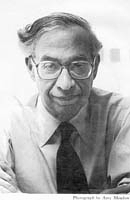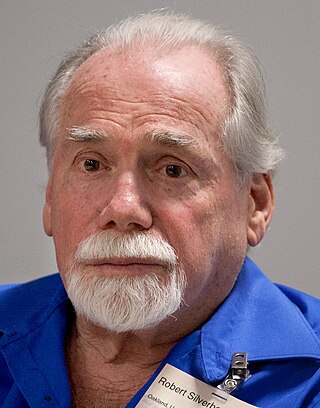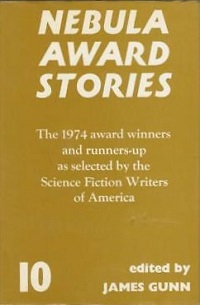
Donald Allen Wollheim was an American science fiction editor, publisher, writer, and fan. As an author, he published under his own name as well as under pseudonyms, including David Grinnell, Martin Pearson, and Darrell G. Raynor. A founding member of the Futurians, he was a leading influence on science fiction development and fandom in the 20th-century United States. Ursula K. Le Guin called Wollheim "the tough, reliable editor of Ace Books, in the Late Pulpalignean Era, 1966 and '67", which is when he published her first two novels in Ace Double editions.

Dangerous Visions is an anthology of science fiction short stories edited by American writer Harlan Ellison and illustrated by Leo and Diane Dillon. It was published in 1967 and contained 33 stories, none of which had been previously published.

Robert Silverberg is an American author and editor, best known for writing science fiction. He is a multiple winner of both Hugo and Nebula Awards, a member of the Science Fiction and Fantasy Hall of Fame, and a Grand Master of SF. He has attended every Hugo Award ceremony since the inaugural event in 1953.
Jack Carroll "Jay" Haldeman II was an American biologist and science-fiction writer. He was the older brother of SF writer and MIT writing professor Joe Haldeman.

Sam Moskowitz was an American writer, critic, and historian of science fiction.

Gordon Randall Phillip David Garrett was an American science fiction and fantasy author. He was a contributor to Astounding and other science fiction magazines of the 1950s and 1960s. He instructed Robert Silverberg in the techniques of selling large quantities of action-adventure science fiction, and collaborated with him on two novels about men from Earth disrupting a peaceful agrarian civilization on an alien planet.
Martin Harry Greenberg was an American academic and anthologist in many genres, including mysteries and horror, but especially in speculative fiction. In all, he compiled 1,298 anthologies and commissioned over 8,200 original short stories. He founded Tekno Books, a packager of more than 2000 published books. He was also a co-founder of the Sci-Fi Channel. Greenberg was also an expert in terrorism and the Middle East. He was a longtime friend, colleague and business partner of Isaac Asimov.
Edgar Pangborn was an American writer of mystery, historical, and science fiction.

Richard Allen Lupoff was an American science-fiction and mystery author, who also wrote humor, satire, nonfiction and reviews. In addition to his two dozen novels and more than 40 short stories, he also edited science-fantasy anthologies. He was an expert on the writing of Edgar Rice Burroughs, and had an equally strong interest in H. P. Lovecraft. He also co-edited the non-fiction anthology All in Color For a Dime, which has been described as "the very first published volume dedicated to comic book criticism"; as well as its sequel, The Comic-Book Book.

David Geddes Hartwell was an American critic, publisher, and editor of thousands of science fiction and fantasy novels. He was best known for work with Signet, Pocket, and Tor Books publishers. He was also noted as an award-winning editor of anthologies. The Encyclopedia of Science Fiction describes him as "perhaps the single most influential book editor of the past forty years in the American [science fiction] publishing world".

Far Horizons: All New Tales from the Greatest Worlds of Science Fiction is an anthology of original science fiction stories edited by Robert Silverberg, first published in hardcover by Avon Eos in May 1999, with a book club edition following from Avon and the Science Fiction Book Club in July of the same year. Paperback and trade paperback editions were issued by Eos/HarperCollins in May 2000 and December 2005, respectively, and an ebook edition by HarperCollins e-books in March 2009. The first British edition was issued in hardcover and trade paperback by Orbit/Little Brown in June 1999, with a paperback edition following from Orbit in July 2000.

The Best Science Fiction of the Year #2 is an anthology of science fiction short stories edited by American writer Terry Carr, the second volume in a series of sixteen. It was first published in paperback by Ballantine Books in July 1973, and reissued in May 1976.

The following is a list of works by science fiction and fantasy author Poul Anderson.
This is a complete bibliography by American science fiction author Larry Niven:

List of the published work of Robert Silverberg, American science fiction author.

Alpha 8 is a science fiction anthology edited by American writer Robert Silverberg, first published as a paperback original by Berkley Medallion in November 1977. No further editions have been issued.

Nebula Award Stories Eight is an anthology of science fiction short works edited by American writer Isaac Asimov. It was first published in hardcover in November 1973, in the United States by Harper & Row and in the United Kingdom by Gollancz. The British edition bore the variant title Nebula Award Stories 8. Paperback editions followed from Berkley Medallion in the U.S. in September 1975, and Panther in the U.K. in the same year; both paperback editions adopted the British version of the title. The book has also been published in German.

Nebula Award Stories 10 is an anthology of award-winning science fiction short works edited by James Gunn. It was first published in the United Kingdom in hardcover by Gollancz in November 1975. The first American edition was published in hardcover by Harper & Row in December of the same year. Paperback editions followed from Berkley Medallion in the U.S. in December 1976, and Corgi in the U.K. in June 1977. The American editions bore the variant title Nebula Award Stories Ten. The book has also been published in German.

Nebula Awards Showcase 2005 is an anthology of award-winning science fiction short works edited by American writer Jack Dann. It was first published in trade paperback by Roc/New American Library in March 2005.














